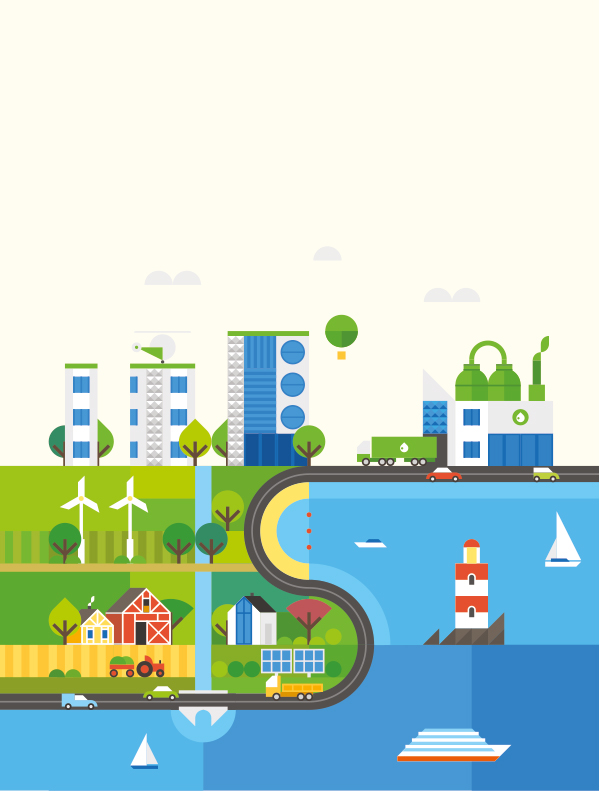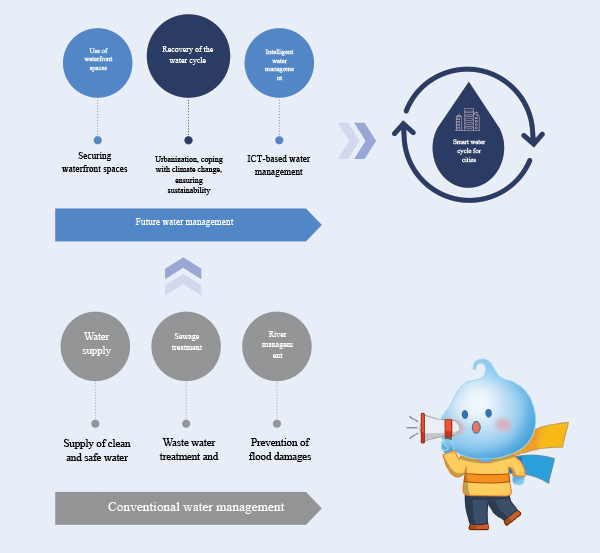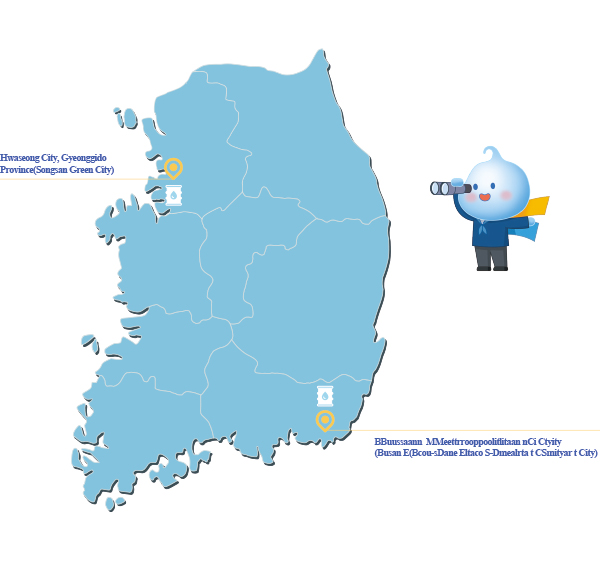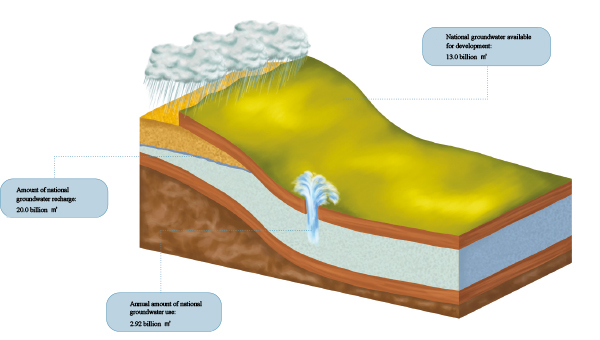
- Water, Nature and Humankind
- K-water Report
-
“K-water increases the value of water by
ensuring every Korean city has a healthy water cycle.”
- Written by. Choi Hang-jwa
- Source by. K-water
- The good management and use of water resources is becoming increasingly important as we try to cope with climate change, and water management policies are constantly evolving. K-water is committed to ensuring a sufficient and stable supply of clean and safe water and keeping cities safe from floods and other water-related disasters by effectively managing the water cycle with smart water management technology. K-water is working diligently to create and maintain a healthy water cycle in Korea’s cities so that every citizen enjoys clean, safe water.

Creating a healthy water cycle
Korea has designed and implemented a wide range of policies, laws and regulations, as well as developing the related technologies, in order to secure a stable water supply, prevent and respond to flood and other disasters, and preserve and manage the water environment.
Nevertheless, extreme weather conditions are making water problems even more diverse and complicated than in the past.
There is a growing consensus on the need to upgrade the current water management system to be able to deal with new and emerging challenges. These challenges can be divided into three categories:(1) environmental factors, such as dry streams, falling levels of ground water, deteriorating water quality and damages to the water ecosystem, rising levels of flooding in river basins, and extreme weather events such as heat waves and heat islands;(2) social factors, such as the constant increase in water use, the growing size of impermeable areas, and diminishing green areas due to urbanization; and(3) policy factors, such as the drive to achieve carbon neutrality. This is why it is necessary to make the shift to a new water cycle paradigm based on integrated water management.
As the leader of water cycle management, K-water has proactively introduced smart technology in all areas of water management including dams, rivers, and ground water. More recently, K-water has implemented digital twin technology for ground water management, an aspect of the water cycle beyond the public’s view, as part of its efforts to manage the water cycle more effectively and systematically. K-water will continue to work with the Ministry of Environment on resolving complex water issues caused by the distorted water cycle in cities with a large population and the growth of impermeable layers due to the heavy concentration of economic and social infrastructures, and on creating a resilient, future-oriented water cycle that can cope effectively with the effects of accelerating climate change in cities across the country.
Smart water cycle, the future of water management

Creating a new water cycle for future cities
K-water is at the forefront of responding proactively to urban water issues and promoting a healthy water cycle. K-water has introduced a new technology for a water cycle city and is currently testing it in residential areas of Busan Eco-Delta Smart City and Songsan Green City. The technology is currently in use in the Smart Village of Busan Eco-Delta Smart City, into which the residents moved last January. Also in use is a smart water management technology that integrates ICT into the entire process of water supply - from rainwater to tap water. Currently under construction is an integrated urban water disaster prevention and management system that monitors the water management infrastructure, including the levels of river flows, water gates, and water discharge facilities, on an ongoing basis. New water cycle technologies will be implemented in Songsan Green City(yet to be created), which will help to spread the smart water cycle management policy across the entire country.
K-water and the Ministry of Environment have jointly conducted research in order to come up with a comprehensive plan for the creation of water safety spaces, and developed a diagnostic evaluation of the water cycle and ways to improve the related policies and regulations, providing fresh momentum to proceed with policies and projects for the creation of future water cycle cities. First, we are developing indicators for diagnosis and evaluation of the water cycle status of cities. Previously, such factors, including water amount and water quality, were evaluated individually. In the current research project, however, we are trying to develop a comprehensive evaluation system that looks into four areas: safety against water disasters, stability in water use, pleasant water environment, and healthy water cycle. These indicators are currently used in evaluating the water cycle in 161 cities and counties. K-water will use the results of the evaluation to select model cities and create water cycle business models, based on which it will push ahead with its water cycle projects. K-water plans to introduce the evaluation system in all cities and counties across the country. This is expected to help create cities that are safe and free from water issues, and help K-water to achieve its goals, including low-impact development and carbon neutrality for future generations.
Pilot Projects for Water Cycle Cities

Use of ground water for a healthy water cycle
The water cycle is a continuous flow of water that consists of precipitation, infiltration, water storage, runoff and evaporation. Although you cannot see it, groundwater is an important component of the water cycle. It helps to adjust water levels in the ground so as to prevent land subsidence, and to control the water flow in rivers by keeping rivers flowing during droughts through base runoffs. Above of all, 13.0 billion tons of ground water is available to use per year, and if surface water and ground water are combined, it can be an effective tool for coping with shortages of water resources in the era of climate change.
Sophistication of groundwater management is one of the key tools that K-water has used to improve its water cycle management.
The National Groundwater Information Center was launched in November 2003 to collect and manage information on groundwater, including water levels, water quality, and the amount of groundwater use. Recently, K-water has been working on the creation of an intelligent smart groundwater data management system that incorporates IoT, AI, big data, digital twin, and other new technologies. Earlier this year, K-water completed a pilot system for groundwater digital twin in which the actual groundwater flows are re-created in 3D, based on the groundwater data accumulated by K-water over the years. The system is expected to allow K-water to predict and promptly respond to disturbances to the water cycle caused by climate change, including the depletion of ground water and water pollution.
Under the new system, K-water is expanding the use of groundwater as an important water resource, as well as the use of groundwater data. As a part of such efforts, K-water collects groundwater that is unused or discarded in urban areas and uses it to improve the water cycle. In addition, ”Groundwater discharge utilization facilities” have been built in the subway stations run by the Daejeon Transportation Corporation and the Yongin Indoor Gymnasium to allow the use of groundwater discharges caused by recent underground development projects in cities for such purposes as air-conditioning, gardening in public parks, and road cleaning. This project is also being implemented in Busan and in Siheung in Gyeonggido Province.
National Groundwater Data


